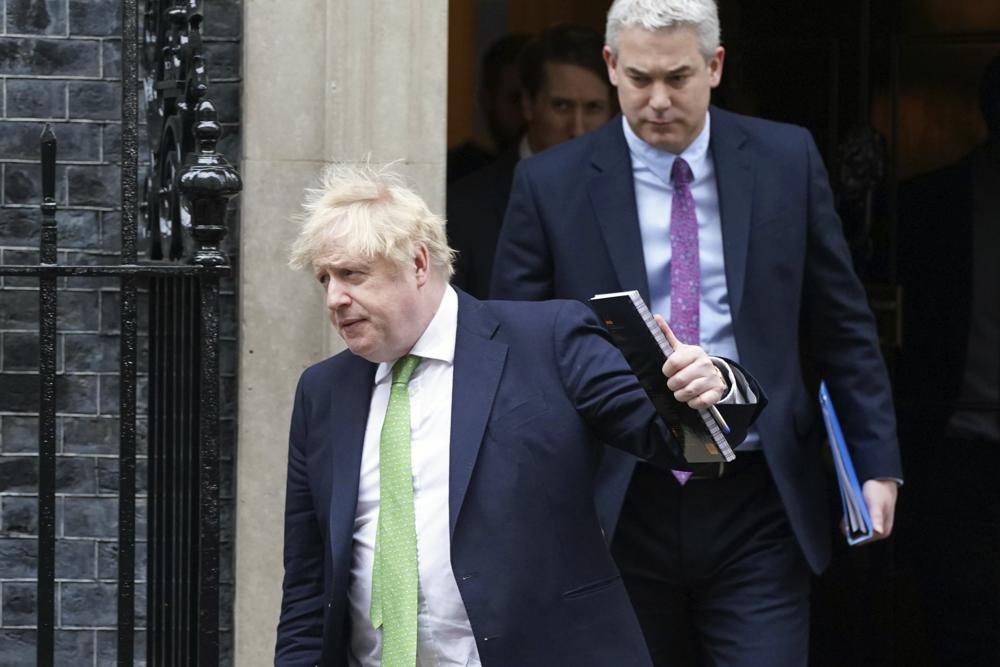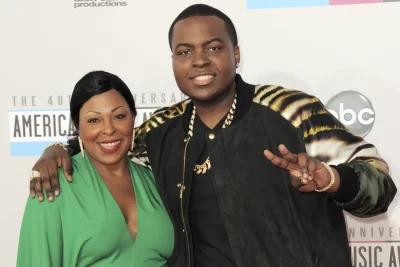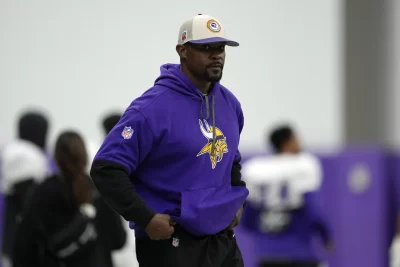
The Latest on the Russia-Ukraine crisis:
BRUSSELS — French foreign minister Jean-Yves Le Drian says the European Union’s 27 members unanimously agree on an initial set of sanctions targeting Russian officials involved in Ukraine.
EU foreign affairs chief Josep Borrell said Tuesday this first package of sanctions “will hurt Russia and it will hurt a lot.”
He said the package would affect members of Russia’s duma who voted against the territorial integrity and sovereignty of Ukraine as well as another 27 people and “entities” which are often companies, banks or agencies.
Borrell added that the package will also affect financing of policies linked to Ukraine by limiting access to EU financial markets.
Referring to Russian actions in Ukraine, Borrell said “this story is not finished.”
The Interior Ministry said Tuesday that security agencies have taken protective measures to avert such attacks and Germany’s national cyber defense center is monitoring developments.
Interior Minister Nancy Faser said on Twitter that authorities “are prepared for all conceivable impacts of this conflict.”
BELVOIR CASTLE, England — Defense ministers from the Baltic states urged world leaders to move swiftly and impose harsh sanctions on Russia, saying their countries know firsthand the dangers of trying to appease a bully.
The Baltic countries’ position on NATO’s eastern flank was at the forefront of discussions Tuesday as defense ministers from the Joint Expeditionary Force met in central England. The U.K.-led force is a group of 10 nations designed to react more quickly in the event of threats like those now posed by Russia.
Latvian Defense Minister Artis Pabriks said in an interview with the Associated Press that world leaders must act swiftly to impose punishing sanctions or it will be too late to stand up for freedom and democracy.
He said failure to stop the Russian president’s “aggression” now would send the message that Moscow can “play around with the Europeans” and the U.S.
MOSCOW — Russian President Vladimir Putin has called for international recognition of Crimea as part of Russia, an end to Ukraine’s NATO membership bid and a halt to weapons shipments there.
Putin claimed Tuesday that Russia’s 2014 annexation of Ukraine’s Crimean Peninsula should be internationally recognized as a legitimate reflection of the local population’s choice, likening it to a vote for Kosovo independence.
The annexation has been widely condemned by Western powers as a breach of international law.
——-
BRUSSELS — NATO Secretary-General Jens Stoltenberg says Russia is taking military action against Ukraine and has condemned Moscow’s decision to recognize separatist areas of southeast Ukraine as independent.
Stoltenberg called the move Tuesday a “serious escalation by Russia and a flagrant violation of international law.” The NATO chief called the military action a “further invasion” of Ukraine by Russia which had already invaded its neighbor in 2014.
He added that there’s “every indication” Russia continues to plan for a full-scale attack on Ukraine.
Stoltenberg said that NATO allies have more than 100 warplanes on high alert and more than 120 warships ready at sea from the Arctic Circle to the Mediterranean Sea.
He said that the NATO response force remains on high readiness but is not yet being deployed, although some allies are moving troops, ships and planes into the Baltic states and near the Black Sea to defend other NATO members.
___
MOSCOW — Russian lawmakers have given President Vladimir Putin permission to use military force outside the country.
The unanimous vote in Russia’s upper house on Tuesday could presage a broader attack on Ukraine after the U.S. said an invasion was already underway there.
The vote formalizes a Russian military deployment to the rebel regions, where an eight-year conflict has killed nearly 14,000 people.
Several European leaders said earlier in the day that Russian troops have moved into rebel-held areas in eastern Ukraine after Putin recognized their independence.
But it was unclear how large the movements were. Ukraine and its Western allies have long said Russian troops are fighting in the region. Moscow denies those allegations.
___
MOSCOW — Russia’s closest allies appeared reluctant to immediately back Moscow’s decision to recognize the independence of rebel-held areas in eastern Ukraine.
The Foreign Ministry of Belarus said Tuesday it saw Russian President Vladimir Putin’s move “with respect and understanding,” but refrained from saying whether Minsk would follow suit and recognize the self-proclaimed Donetsk and Luhansk republics.
Officials in Kazakhstan whose president last month asked for a Russia-led security alliance to send troops to quell violent unrest, said the issue of recognizing the separatist regions was not on the country’s agenda.
Azerbaijani President Ilham Aliyev who’s in Moscow for talks with Putin, made no mention of Moscow’s recognition of Donetsk and Luhansk in his publicly broadcast remarks, but focused instead on bilateral relations.
Another Russian ally, Armenia, has so far issued no message of support for the Russian move.
Meanwhile, Putin sought to reassure Russia’s ex-Soviet allies that he doesn’t envision resurrecting the Soviet Union. He told the Azerbaijani president that speculation that Russia would attempt to restore its empire “is absolutely not true.”
___
WASHINGTON — The White House has begun referring to Russian troop deployments in eastern Ukraine as an “invasion” after initially hesitating to use the term — a red line that President Joe Biden has said would result in the U.S. levying severe sanctions against Moscow.
Jon Finer, the principal deputy national security adviser, said Tuesday: “We think this is, yes, the beginning of an invasion, Russia’s latest invasion into Ukraine.” He said “latest” was important — “an invasion is an invasion and that is what is under way.”
The White House decided to begin referring to Russia’s actions as an “invasion” because of the situation on the ground, according to a U.S. official who spoke on the condition of anonymity to discuss internal deliberations.
The administration resisted initially calling the deployment of troops because the White House wanted to see what Russia was actually going to do. The official added that, after assessing Russian troop movements, it became clear it was a new invasion.




